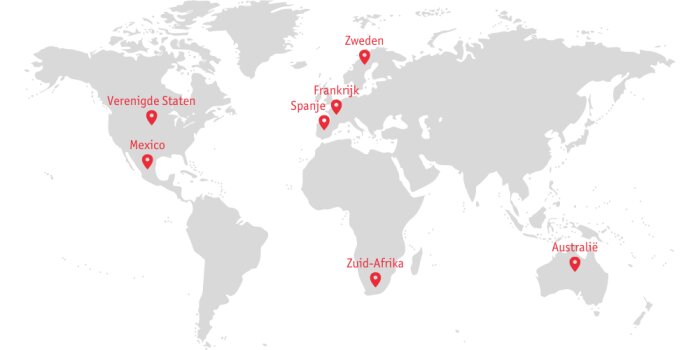Below you can find the answers to frequently asked questions:
- Erasmus, what's that?
- Where can I go on exchange?
- Can I do an internship abroad?
- How much does an experience abroad cost?
- Where do I stay when I’m abroad?
- Will my studies take longer if I go on exchange?
- Are there any alternatives to studying abroad for a longer period?
Any other questions? Visit the Go Global Week, our internationalisation event organised annually in November.
Erasmus, what’s that?
Simply put, Erasmus allows you to go on exchange at another university within Europe. You can also use Erasmus to gain work experience as an intern.
But in addition to Erasmus (exchange within Europe), the University of Antwerp offers other exchange opportunities. Partnerships with other institutions abroad allow you to acquire experience outside of Europe. Curious about the destinations available to you?
All of our exchange opportunities have the same basic principles to make your international experience unforgettable. These include:
- Your studies will not take longer, because the classes you took abroad count towards the completion of your programme
- As a student at the University of Antwerp, you don’t have to pay the registration fee at your host institution
- We support and supervise your entire exchange process: from your welcome, language preparations and accommodation to activities with other international students.
All of the information on scholarships and specific destinations available to you can be found in the student portal of your programme and Mobility Online, the tool our university uses for exchanges.
Where can I go on exchange?
Where you can go on exchange depends on your programme. Each faculty offers destinations within Europe (Erasmus), but also in Belgium (Erasmus Belgica). Destinations outside of Europa are also available (faculty agreements - institutional agreements).
- Destinations only available for students from specific faculties (Erasmus study - Erasmus Belgica - Faculty agreements)
- Destinations open to all students of the University of Anwterp (institutional agreements)
Would you like to go to South Africa, France or the United States?
-
 Popular destinations at the University of Antwerp include South Africa, France and the United States
Popular destinations at the University of Antwerp include South Africa, France and the United States
Can I do an internship abroad?
You sure can! At the University of Antwerp, we believe that an internship perfectly complements your studies. And why not do it abroad? All students, including those who are close to graduating, can do an internship.
You can do an internship both within and outside of Europe, in the Global South or anywhere else in the world. Every year, around thirty Medicine students do an internship in Africa, Asia or Latin America.
If you’re close to graduating, you can do a post-studies internship through the Erasmus+ programme to optimally prepare yourself for entering the labour market.
If you have any questions about specific internships, you can direct them to your faculty.
How much does an experience abroad cost?
The financial costs of an international experience consist of several elements and are different for everyone. More expensive experiences abroad include exchanges, while attending a summer school and going on a group trip are more affordable alternatives. Having said that, the country and accommodation you’re staying in also make a huge difference.
Not to worry though, because for most experiences abroad there are scholarship opportunities to keep the costs down. There’s the Erasmus scholarship if you’re staying within Europe, but you can also get a scholarship when you go outside of Europe (although this is not a guarantee). The allocation of these scholarships depend on the destination, programme and student charter. You’ll receive programme-specific information on these aspects when you start studying at our university.
Would you like to have an idea of the costs at your destination? There are countless student reports in the student portal that detail how much students spent on accommodation, travel expenses, food, etc. The International Relations Office will also be happy to answer any questions you may have about scholarships and reduced fees.
Where do I stay when I’m abroad?
Accommodation differs for every exchange, as you choose it completely independently! In the student portal you can find many tips helping you look for accommodation. You can choose to stay in a room, at a hall of residence or with a guest family, whichever you prefer.
In case of a study trip or internship, it may be that your accommodation has been pre-arranged for you. On exposures you often stay with a guest family, which means you’ll also know about your accommodation in advance.
Will my studies take longer if I go on exchange?
Good news: no, your studies won’t take longer if you go on exchange. Your study period abroad will be integrated into your programme and will therefore not cause any study delays.
Are there any alternatives to studying abroad for a longer period?
If you’d prefer not to do an exchange or an internship for a whole semester or academic year, there are plenty of alternatives. We attach great value to inclusive forms of internationalisation for everyone, because anyone could do with some international skills. In addition to the well-known Erasmus exchanges or internships abroad, we also offer short mobility and internationalisation@home.
Examples of internationalisation at home include English-language education, international visiting lecturers, and summer and winter schools at our university (Antwerp Summer and Winter University) or abroad. You’ll find all the opportunities for your programme in the short international experience section of the student portal.